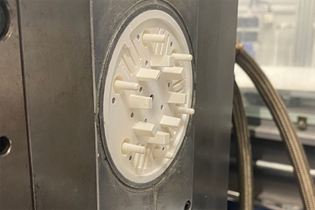Turnaround time can be as low as 24 hours, although two or three days might be more typical. Rapid prototyping like this is especially useful to quickly identify critical end-use part geometries that will work in the molding process. Key components include material choice, 3D printing technology selected, use of adaptable mold bases for the mold inserts and implementation of appropriate injection molding process conditions. This presentation will review work conducted toward the assessment of a high-stiffness, high-temperature-resistant ceramic modified urethane acrylate for injection molding inserts.
Agenda:
- Guide for 3D-printed injection mold inserts
- Optimization of digital light processing (DLP) printing
- Compatibility with various thermoplastics
- Real-world application success stories



